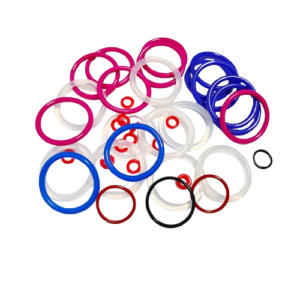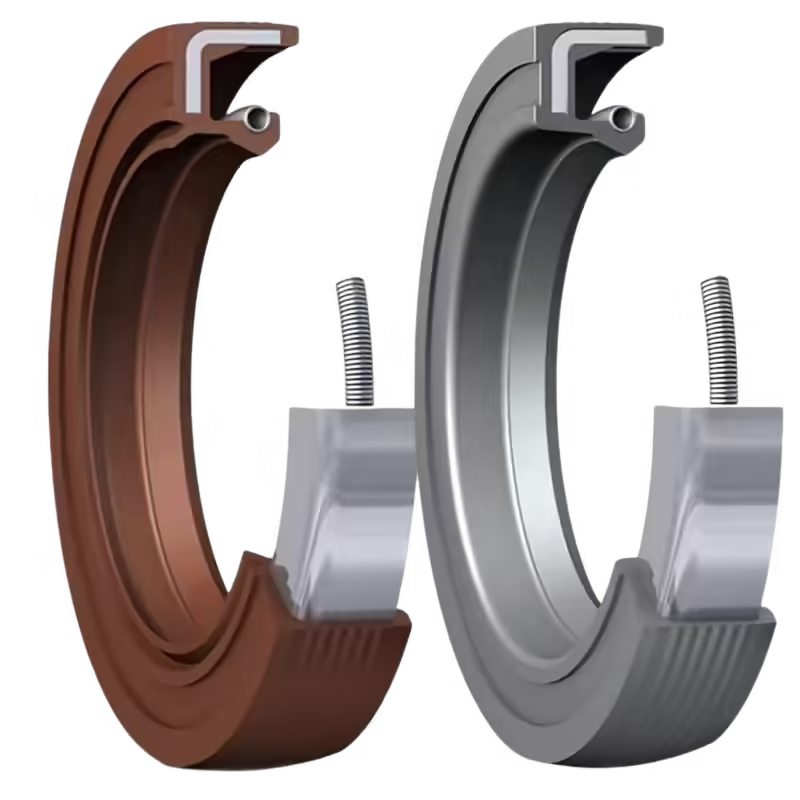Traditional vs. Silicone Gaskets: Which Is Better for Oil-Tight Applications?
1. Introduction: The Critical Role of Gaskets in Industrial Applications
Gaskets are essential components in many types of machinery and equipment. From industrial machines and automotive engines to food processing systems, gaskets create tight seals that prevent leaks, protect internal parts, and ensure efficient operation. Selecting the right gasket material is crucial, as it can significantly impact performance, safety, and maintenance costs. This article compares two popular types of gaskets—traditional materials (such as rubber, cork, or metal) and silicone—to help you understand which is best for oil-tight and other specialized applications.


2. Understanding Gasket Materials: Traditional vs. Silicone
What Are Traditional Gaskets?
Traditional gaskets are commonly made from materials like nitrile rubber (NBR), Viton, cork, asbestos-free compounds, or even metal. These materials are widely used in industrial and automotive settings due to their strong resistance to petroleum-based oils. You’ll often find them in applications such as oil pans, hydraulic systems, and industrial pumps, where their ability to maintain a tight, oil-resistant seal is vital.
What Are Silicone Gaskets?
Silicone gaskets are produced from a high-performance synthetic elastomer known for its excellent temperature range and flexibility. They can operate from as low as -60°C up to 230°C, which makes them suitable for very hot or cold conditions. However, silicone does not tolerate petroleum-based oils, meaning it is not suitable for oil-tight applications. Instead, silicone gaskets excel at sealing water and other non-oil fluids. They are also non-toxic, extremely soft, and require minimal compression, making them ideal for food processing equipment, potable water systems, and other hygiene-sensitive industries.
3. Key Comparison Factors
3.1 Temperature Resistance
- Traditional Gaskets: Generally handle moderate temperatures (around 100-150°C), which is typically sufficient for standard industrial and automotive uses.
- Silicone Gaskets: Offer a much wider temperature range (-60°C to 230°C), making them suitable for more extreme conditions. However, their lack of oil resistance limits their use in many high-temperature, oil-based systems.
3.2 Oil Resistance
- Traditional Gaskets: Certain traditional materials, such as NBR or Viton, are highly resistant to oil and are the preferred choice for oil-tight applications.
- Silicone Gaskets: Not oil-resistant at all. Prolonged contact with petroleum-based oils causes silicone gaskets to break down, making them unsuitable where oil sealing is required.
3.3 Sealing Performance and Installation
- Traditional Gaskets: While rubber-based materials create good seals, they often need higher compressive forces. Cork or metal gaskets are more rigid and also require significant pressure to form a reliable seal.
- Silicone Gaskets: Highly flexible and soft, silicone gaskets seal effectively with minimal pressure. They are a great option for applications where quick assembly or low clamping force is necessary.
3.4 Toxicity and Hygiene
- Traditional Gaskets: Some traditional materials may release harmful substances at very high temperatures, making them less suitable for food-grade or medical uses.
- Silicone Gaskets: Completely non-toxic and meet strict hygiene standards, making them the top choice for applications in the food and medical industries.
3.5 Cost Efficiency
- Traditional Gaskets: Typically more affordable and offer an excellent cost-performance ratio for most industrial needs, especially where oil-tight sealing is important.
- Silicone Gaskets: Usually more expensive, but they are indispensable in environments where cleanliness, extreme temperatures, and non-toxicity are critical requirements.
4. Application Suitability: Which to Choose?
When to Use Traditional Gaskets:
- If you need a strong, oil-resistant seal in industrial or automotive settings—such as engine oil pans, hydraulic equipment, or industrial pumps—traditional gaskets are your best bet. They handle typical temperature ranges well and are cost-effective where hygiene requirements are not a main concern.
When to Use Silicone Gaskets:
- If your application does not involve petroleum-based oils, silicone gaskets are worth considering. They are ideal for sealing water in food processing machinery, potable water systems, and environments demanding strict hygiene. Their superior temperature tolerance and minimal compression requirements also make them suitable for certain specialized conditions.
5. Conclusion: Choosing the Right Gasket for Your Application
Selecting the right gasket material depends on the application’s unique conditions. Traditional gaskets offer reliable oil resistance, making them the go-to choice for oil-tight environments. Silicone gaskets, on the other hand, are unmatched when it comes to non-toxicity, hygiene, flexibility, and a wide operational temperature range—provided that no petroleum-based oils are present.
In essence, if you need oil-tight sealing, stick with traditional gasket materials. If you require a food-grade, clean, and flexible sealing solution in a non-oil environment, silicone gaskets are the ideal option.
6. Call to Action: Find the Ideal Gasket for Your Application
To ensure you choose the perfect gasket material for your specific needs—whether that involves handling oils, ensuring food safety, or dealing with high temperatures—consider speaking with a professional supplier. Expert guidance will help you identify the best solution and ensure reliable, long-lasting performance.
For professional assistance and guidance, please contact us:
Website: drorubber.com
WhatsApp: +0086 15815831911
WeChat: +0086 13784044874





